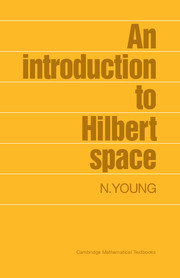Book contents
- Frontmatter
- Contents
- Foreword
- Introduction
- 1 Inner product spaces
- 2 Normed spaces
- 3 Hilbert and Banach spaces
- 4 Orthogonal expansions
- 5 Classical Fourier series
- 6 Dual spaces
- 7 Linear operators
- 8 Compact operators
- 9 Sturm–Liouville systems
- 10 Green's functions
- 11 Eigenfunction expansions
- 12 Positive operators and contractions
- 13 Hardy spaces
- 14 Interlude: complex analysis and operators in engineering
- 15 Approximation by analytic functions
- 16 Approximation by meromorphic functions
- Appendix: square roots of positive operators
- References
- Answers to selected problems
- Afterword
- Index of notation
- Subject index
- Frontmatter
- Contents
- Foreword
- Introduction
- 1 Inner product spaces
- 2 Normed spaces
- 3 Hilbert and Banach spaces
- 4 Orthogonal expansions
- 5 Classical Fourier series
- 6 Dual spaces
- 7 Linear operators
- 8 Compact operators
- 9 Sturm–Liouville systems
- 10 Green's functions
- 11 Eigenfunction expansions
- 12 Positive operators and contractions
- 13 Hardy spaces
- 14 Interlude: complex analysis and operators in engineering
- 15 Approximation by analytic functions
- 16 Approximation by meromorphic functions
- Appendix: square roots of positive operators
- References
- Answers to selected problems
- Afterword
- Index of notation
- Subject index
Summary
What prospects are in view, what further peaks accessible from the high ground of Hilbert space? We trust our teachers, that the agony of learning they inflict on us is to good purpose, but resolution flags, and may perhaps be quickened by the contemplation of our goal.
Euclid was able to permit himself a lordly response to a pupil who asked about the uses of geometry. According to tradition Euclid summoned a servant and instructed him to give a penny to the pupil so that he should have profit from his studies. If your sympathies are with the recipient of the coin try reading A Mathematician's Apology (Hardy, 1940) for an updated and cogently argued presentation of the Euclidean attitude. Hardy firmly divides mathematics into two kinds: the useful but boring and ‘real mathematics’ which is beautiful but of no use whatever. In his inaugural lecture as professor at Oxford Hardy came close to saying that the value of mathematics is to absorb harmlessly the intellectual energies of very clever people who might otherwise be making weapons of destruction. Hardy was the most influential British mathematician of the day and his views took a long time to live down. Since then higher education has grown hugely, more colleges and new disciplines are vying for their share of the public purse, and we are all more conscious of the scrutiny of the Treasury and more careful of the public's perception.
- Type
- Chapter
- Information
- An Introduction to Hilbert Space , pp. 230 - 235Publisher: Cambridge University PressPrint publication year: 1988



